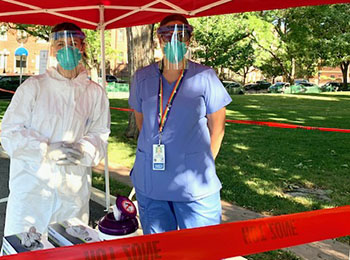Helping the Most Vulnerable Population
(October 2021) The COVID-19 pandemic has been especially disastrous for people experiencing homelessness. Lack of secure housing has been identified as a risk factor for contracting COVID-19, and higher rates of underlying medical conditions and restricted
access to medical care have resulted in more hospitalization and mortality for the homeless population.
The unhoused population also includes a larger share of some communities of color. In metro Denver, Black individuals make up 23.5%
of the homeless community, despite being only 5.3% of the general population. Native Americans make up 4.9% of the homeless population, despite accounting for less than 1% of the area’s population.
Sarah Rowan, MD, and Sarah Stella,
MD, have been working to mitigate the pandemic’s impact on Denver metro’s more than 5,500 individuals experiencing homelessness.
 Sarah Rowan, MD, and Sarah Stella, MD, have been working to care for Denver’s unhoused population during the pandemic.
Sarah Rowan, MD, and Sarah Stella, MD, have been working to care for Denver’s unhoused population during the pandemic.They are members of the Denver Joint Task Force, a group of clinical, public health, shelter, and other community partners that is coordinating the multifaceted response to COVID-19 in Denver’s unhoused community.
At the start of the pandemic, the group focused on education, support, and testing in major shelters and encampments, as well as creating strategies for safely isolating and protecting vulnerable individuals.
As vaccines became available, the group worked quickly to get vaccinations for staff at shelters so that they were protected and able to keep shelters open. The goal was also to build credibility for vaccination among the homeless population.
“It gave people in the shelters some confidence that the staff that they know and trust got the vaccine, sort of in the same way that having health care providers get the vaccine early demonstrated our confidence in the vaccine and may have helped others to have confidence in it,” says Rowan, an associate professor in the Division of Infectious Diseases.
After vaccinating the shelter workers, the task force turned its attention to vaccinating Denver’s homeless population, taking with them the lessons they learned during the testing phase.
“We knew from our earlier testing work that if we were going to vaccinate people, we needed to have a very low-barrier approach,” says Stella, an associate professor in the Division of Hospital Medicine. “We needed to go where the people were, both literally and figuratively.”
Although Rowan and Stella say that the vaccination efforts have overall been successful, Stella says it’s still “full court press,” as they work to ensure that everyone receives their second dose, while also caring for others who have newly arrived at Denver shelters.
The Centers for Disease Control and Prevention has provided funding to the City and County of Denver so that the joint task force’s work can continue for at least the next two years. Rowan and Stella hope to use the grant to continue to tackle the pandemic needs and other health issues affecting Denver’s homeless community.
“We’re excited to continue this collaboration with a focus on improving the health and well-being of people experiencing homelessness in Denver and apply some of the lessons we’ve learned over the course of the pandemic,” Stella says.